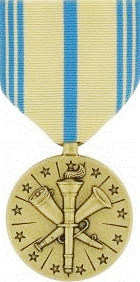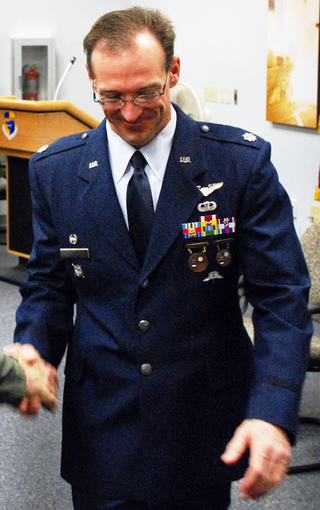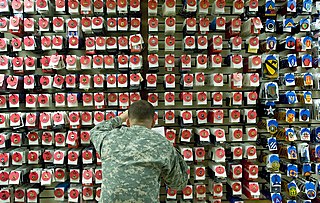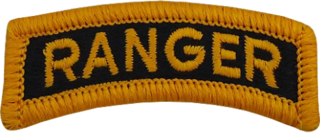
The Institute of Heraldry, officially The Institute of Heraldry, Department of the Army, is an activity of the Administrative Assistant to the Secretary of the Army solely responsible for furnishing heraldic services to the President of the United States and all federal government agencies. Title 18 of the United States Code, Chapter 33, Section 704 and Title 32 of the Code of Federal Regulations, Part 507 permit the institute to issue directives on how military insignia are displayed, the criteria for issuance, and how insignia will be worn on military uniforms.

The awards and decorations of the United States Armed Forces include various medals, service ribbons, ribbon devices, and specific badges which recognize military service and personal accomplishments of members of the U.S. Armed Forces. Such awards are a means to outwardly display the highlights of a service member's career.
The Navy "E" Ribbon or Battle Efficiency Ribbon was authorized on March 31, 1976, by Secretary of the Navy J. William Middendorf as a unit award for battle efficiency competition. The service ribbon replaced the "E" patch previously sewn on the right sleeve of the enlisted naval uniform for rates/pay grades E-1 through E-6.

The Special Forces Tab is a service school qualification tab of the United States Army, awarded to any soldier completing the Special Forces Qualification Course at the U.S. Army John F. Kennedy Special Warfare Center and School, Fort Liberty, North Carolina. Soldiers who are awarded the Special Forces Tab are authorized to wear it, as well as the green beret for the remainder of their military careers, even when not serving in a Special Forces command.

A service stripe is an embroidered diagonal stripe worn on the sleeve(s) of some military and paramilitary uniforms. In the case of the United States military, service stripes are authorized for wear by enlisted personnel on the lower part of the sleeve of a uniform to denote length of service. Service stripes vary in size and in color.

The Armed Forces Reserve Medal (AFRM) is a service medal of the United States Armed Forces that has existed since 1958. The medal recognizes service performed by members of the reserve components and is awarded to both officers and enlisted personnel. The medal is considered a successor award to the Naval Reserve Medal and the Marine Corps Reserve Ribbon, which were discontinued in 1958 and 1965, respectively.

The diver insignia are qualification badges of the uniformed services of the United States which are awarded to servicemen qualified as divers. Originally, the diver insignia was a cloth patch decoration worn by United States Navy divers in the upper-portion of the enlisted service uniform's left sleeve during the first part of World War II, when the rating insignia was worn on the right sleeve. When enlisted rating insignia were shifted to the left sleeve in late World War II, the patch shifted to the upper right sleeve. The diving patch was created during World War II, and became a breast insignia in the late 1960s.

The Army Combat Uniform (ACU) is the current combat uniform worn by the United States Army, U.S. Air Force, U.S. Space Force and some elements of the U.S. Coast Guard. Within the Air Force and Space Force, it is referred to as the OCP Uniform, rather than the Army Combat Uniform.

Badges of the United States Army are military decorations issued by the United States Department of the Army to soldiers who achieve a variety of qualifications and accomplishments while serving on active and reserve duty in the United States Army.

Badges of the United States Air Force are specific uniform insignia authorized by the United States Air Force that signify aeronautical ratings, special skills, career field qualifications, and serve as identification devices for personnel occupying certain assignments.

Obsolete badges of the United States military are a number of U.S. military insignia which were issued in the 20th and 21st centuries that are no longer used today. After World War II many badges were phased out of the United States Armed Forces in favor of more modern military badges which are used today.

The awards and decorations of Civil Air Patrol are "designed to recognize heroism, service, and program achievements" of members of Civil Air Patrol (CAP) of the United States of America. The CAP is the official auxiliary of the United States Air Force. These awards are made to improve the esprit de corps of members. These awards are all worn in the form of medals or ribbons and all are considered civilian decorations. Civil Air Patrol regulations allow them to only be worn and displayed on appropriate CAP uniforms.

A distinctive unit insignia (DUI) is a metallic heraldic badge or device worn by soldiers in the United States Army. The DUI design is derived from the coat of arms authorized for a unit. DUIs may also be called "distinctive insignia" (DI) or, imprecisely, a "crest" or a "unit crest" by soldiers or collectors. The U.S. Army Institute of Heraldry is responsible for the design, development and authorization of all DUIs.

Shoulder sleeve insignia (SSI) are distinctive cloth patches worn on the left sleeve of the United States Army uniform just below the shoulder seam by soldiers assigned to divisions, corps, armies, and other specifically authorized organizations. They are also worn on the right sleeve by soldiers to indicate former overseas service with certain units during periods of U.S. military operations in hostile conditions (MOHC).

The uniforms of the United States Navy include dress uniforms, daily service uniforms, working uniforms, and uniforms for special situations, which have varied throughout the history of the navy. For simplicity in this article, officers refers to both commissioned officers and warrant officers.

The President's Hundred tab/brassard is a badge awarded by the Civilian Marksmanship Program (CMP) to the 100 top-scoring military and civilian shooters in the President's Pistol and President's Rifle Matches.
The uniforms of the United States Army distinguish soldiers from other service members. U.S. Army uniform designs have historically been influenced by British and French military traditions, as well as contemporary U.S. civilian fashion trends. The two primary uniforms of the modern U.S. Army are the Army Combat Uniform, used in operational environments, and the Army Green Service Uniform, worn during everyday professional wear and during formal and ceremonial occasions that do not warrant the wear of the more formal blue service uniform.

The Ranger tab is a service school qualification tab of the United States Army, awarded to any soldier who completes Ranger School at the U.S. Army Fort Moore, Georgia. Soldiers who are awarded the Ranger tab are authorized to wear it for the remainder of their military careers. The Ranger tab is considered the pre-eminent award for soldiers in combat arms branches within the United States Army. It is considered an unwritten rule in the Infantry Branch that a Ranger tab is required to achieve full career success, with the majority of commissioned and non-commissioned officers serving in battalion and above leadership roles holding the award.

In the United States Army, tabs are cloth and/or metal arches that are worn on U.S. Army uniforms, displaying a word or words signifying a special skill. On the Army Combat Uniform and Army Service Uniform, the tabs are worn above a unit's shoulder sleeve insignia (SSI) and are used to identify a unit's or a soldier's special skill(s) or are worn as part of a unit's SSI as part of its unique heritage. Individual tabs are also worn as small metal arches above or below medals or ribbons on dress uniforms.

Awards and decorationsof the Texas Military are medals, ribbons, badges, tabs, trophies, plaques, certificates, memorials, monuments, holidays, and general honors that recognize service and achievement in the Texas Military Forces.




















